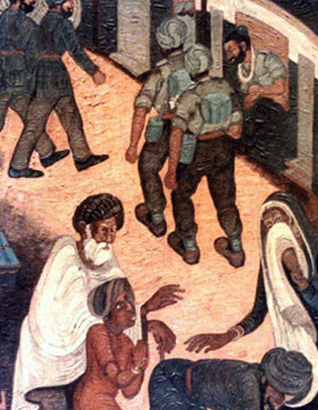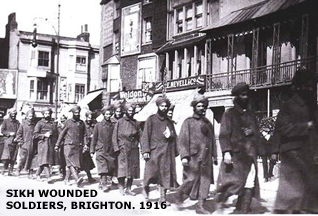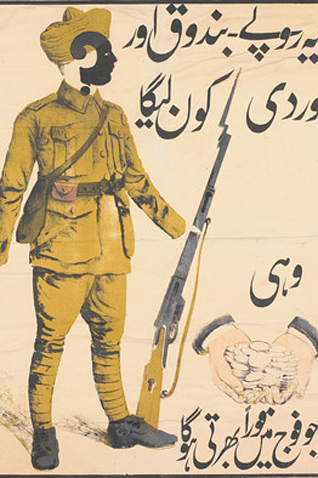
Above: Farewell (1945) by Pran Nath Mago. Image below, 1st from bottom - Punjab Recruitment Poster: “Who will get this money, rifle and uniform? The one who will enlist in the army immediately.” (Both photo & translation, courtesy, Amarjit Singh Chandan)


Poetry
Echoes of WWI
In Punjab’s Folk Songs
KARAN DEEP SINGH
A century after World War I -- a conflict in which some 1.3 million soldiers from the subcontinent, mostly Sikhs and Punjabis fought -- echoes of the Great War can still be found in fading folk songs and poetry once popular in corners of rural Punjab.
Academics have long been intrigued by the expressions of love, separation and death imbedded in folklore from the time, particularly in Punjab, an area that contributed nearly half of the Indian army’s volunteer soldiers then.
The songs and poems were typically sung by women.
Recently, a London-based poet Amarjit Singh Chandan has been translating some of the works and reciting them in public addresses and performances.
“Nobody ever talks about them, not to speak of singing them,” he says.
He attributes that partly to a sense of shame over the fact that the soldiers had fought for the British Empire, a colonial oppressor.
Many of the songs are heart-wrenching accounts of women left behind, longing for their husbands, brothers and sons to return from “l’arme,” or “war” in Punjabi -- a word, interestingly, that was adopted widely into the Punjabi language around the time of World War I and is based on the French word for “weapon.”
Here is an excerpt from one song as translated by Amarjit. The word ‘chhalla’ would be translated as “my darling”:
Chhalla, here comes the lorry
I carry a heavy basket on my head
I stand and wait for him on the road
With tears in my eyes
Some songs display fears among women that the British were losing the war to Germany.
Rawail Singh, a professor in the Punjabi Department at Delhi University, says anti-German sentiment expressed in folk wisdom from the time likely reflects the view of Germany as evil for starting the war.
An excerpt from one such piece:
May you be defeated, O Germany
You have taken my man as a prisoner
May you be wiped out, O Germany
Who has torn the sisters apart from their brothers
The power of folk music wasn’t lost on the military.
A popular song of the time, performed and recorded by Bhai Chhaila Patialewala, a famous singer then, was used in effect as an Army propaganda piece, according to Amarjit.
“It would have been played in village fairs and recruitment gatherings,” he says, urging the Punjabi men to join the war effort in return for benefits such as tastier food and better clothing.
Here is an excerpt as translated by him. ‘Roti’ refers, of course, to the Punjabi flatbread:
The recruits are at your door step
Here you eat dried roti
There you’ll eat fruit
Here you are in tatters
There you’ll wear a suit
Here you wear worn out shoes
There you’ll wear boot[s]
“This song must be seen in the context of Punjab’s socioeconomic conditions at that time,” says Prof. Rawail Singh. People were poor, and the British offer of 11 rupees a month (just pennies today, but a more sizeable amount at the time) was tempting for would-be soldiers.
The Sikh and Punjabi role in World War I is starting to draw wider attention today, a century after the conflict.
Recently the singer Daler Kaur covered one such song, “Ve murrh aa lama to(n),” the title of which translates loosely as a woman calling on a loved one to return from war. It was originally sung by Surinder Kaur and written by Punjabi poet Kartar Singh Blaggan.
And the noted Punjabi playwright Atamjit (Singh) says he has begun research for a full-length play based on the war. The main focus, he says, will be on remembering the loss of lives as told through from the Punjabi community.
“We owe a responsibility to remember. It is already too late,” he says.
The author is a freelance journalist working in New Delhi, India.
[Courtesy: The Wall Street Journal. Edited for sikhchic.com]
December 31, 2014
Conversation about this article
1: Kaala Singh (Punjab), December 31, 2014, 11:35 AM.
It is a matter of pride that Sikhs punched much above their weight in their history of 500 years. From obscurity to statehood and then building their state through war and conquest and then losing it to treachery and then playing an important role in both world wars despite small numbers and not having a state of their own, and building successful communities across the globe with sheer hard work and struggle. Then losing another opportunity in 1947 to have their own place in the world due to an incompetent leadership. And then the struggle to protect their faith and rights and ultimately surviving against all odds. This is a fascinating story and must be told in full. We have accomplished more than many of the established nations. Who says we are not a nation?
2: Harinder Singh (Punjab), January 01, 2015, 1:39 AM.
Sikh are a Nation, and yet much, much more. They are a civilization flourishing in every nook and corner of the world ...
3: Hardev Singh (Richmond Hill, Ontario, Canada), January 01, 2015, 1:43 AM.
Well said, Kala Singh ji. Your comments are always insightful, with a fresh and honest perspective ... and a pleasure to read.


